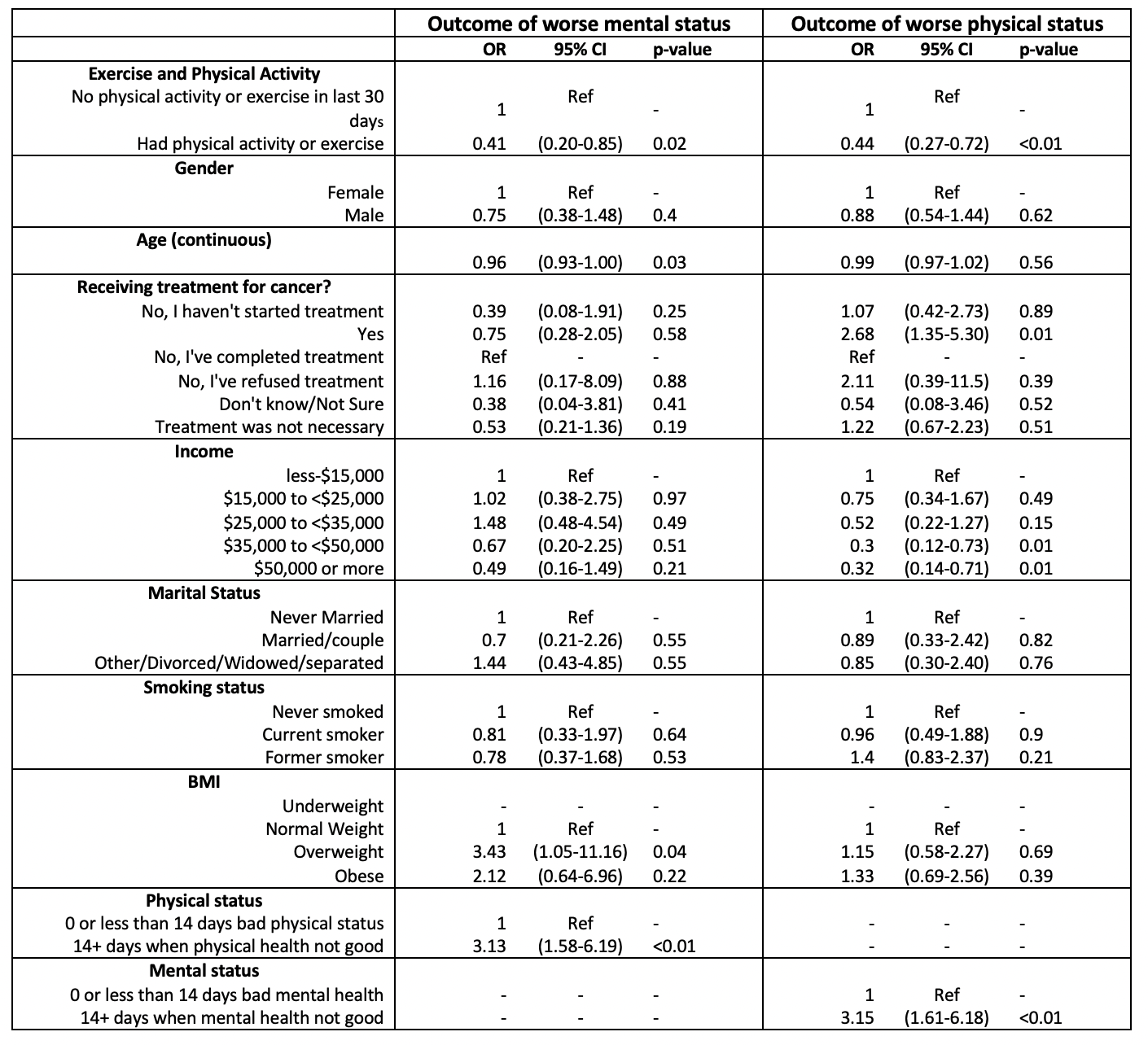Back
Patient-reported Outcomes
13: The Role of Exercise on the Physical and Mental Health of Kidney Cancer Patients and Survivors
Location: Poster Hall, Board A5
Width: 
Table 1

Multivariable logistic regression models for the outcomes of having worse mental health (>14 days per month) and having poor physical health (>14 days per month) in our study cohort.
- DR
Daniel Roberson, MD
Resident Physician
Division of Urology, University of Pennsylvania, United States
Poster Presenter(s)
Background: Kidney cancer negatively impacts a patient's physical and mental health from diagnosis, to treatment, into survivorship. It is crucial to consider modifiable behavioral factors in order to improve quality of life of this population. We hypothesize that a lack of physical activity or exercise is associated with worse physical and mental health.
Methods: This is a cross-sectional retrospective study of self-reported kidney cancer patients from the Behavioral Risk Factor Surveillance System database from 2016 to 2020. Descriptive characteristics were calculated. We used multivariable logistic regression modeling analyses (MVA), adjusting for gender, age, treatment status, income, marital status, smoking status, and BMI to assess the outcomes of (a) 14+ days per month when mental health was not good and (b) 14+ days per month when physical health was not good.
Results: Out of 2,193,981 survey participants, we identified 576 kidney cancer patients and survivors. 217 (37.7%) reported no physical activity or exercise in the last 30 days, whereas 358 (62.3%) reported physical activity or exercise in the last 30 days. Those who were active were significantly less likely to report worse mental status compared to those who were not active (OR 0.41, 95% CI 0.20 – 0.85, p=0.02). Moreover, physical activity and exercise had similar results for the outcomes of poor physical health (OR 0.44, 95% CI 0.27 – 0.72, p< 0.01) (Table 1).
Conclusions: Those who reported physical activity and exercise were significantly less likely to report poor mental and physical health. Our results highlight the importance of exercise and physical activity as a modifiable behavioral risk factor to improve quality of life, and we postulate that physical activity may serve to mitigate or prevent common side effects of kidney cancer diagnosis, treatment, and survivorship.
Methods: This is a cross-sectional retrospective study of self-reported kidney cancer patients from the Behavioral Risk Factor Surveillance System database from 2016 to 2020. Descriptive characteristics were calculated. We used multivariable logistic regression modeling analyses (MVA), adjusting for gender, age, treatment status, income, marital status, smoking status, and BMI to assess the outcomes of (a) 14+ days per month when mental health was not good and (b) 14+ days per month when physical health was not good.
Results: Out of 2,193,981 survey participants, we identified 576 kidney cancer patients and survivors. 217 (37.7%) reported no physical activity or exercise in the last 30 days, whereas 358 (62.3%) reported physical activity or exercise in the last 30 days. Those who were active were significantly less likely to report worse mental status compared to those who were not active (OR 0.41, 95% CI 0.20 – 0.85, p=0.02). Moreover, physical activity and exercise had similar results for the outcomes of poor physical health (OR 0.44, 95% CI 0.27 – 0.72, p< 0.01) (Table 1).
Conclusions: Those who reported physical activity and exercise were significantly less likely to report poor mental and physical health. Our results highlight the importance of exercise and physical activity as a modifiable behavioral risk factor to improve quality of life, and we postulate that physical activity may serve to mitigate or prevent common side effects of kidney cancer diagnosis, treatment, and survivorship.
